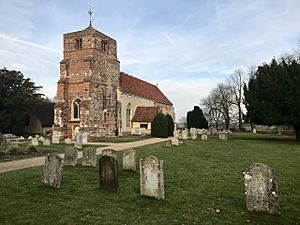St Mary's Church, Lawford facts for kids
Quick facts for kids St Mary's Church, Lawford |
|
|---|---|

St Mary's Church, Lawford, from the west
|
|
| Lua error in Module:Location_map at line 420: attempt to index field 'wikibase' (a nil value). | |
| OS grid reference | TM 089,316 |
| Location | Church Hill, Lawford, Essex |
| Country | England |
| Denomination | Anglican |
| Website | St Mary, Lawford |
| History | |
| Status | Parish church |
| Dedication | Saint Mary the Virgin |
| Architecture | |
| Functional status | Active |
| Heritage designation | Grade I |
| Designated | 17 November 1966 |
| Architectural type | Church |
| Style | Gothic |
| Specifications | |
| Materials | Flint, septaria and brick, with limestone dressings Tiled roof |
| Administration | |
| Parish | Lawford |
| Deanery | Harwich |
| Archdeaconry | Colchester |
| Diocese | Chelmsford |
St Mary's Church is a beautiful old church located on Church Hill in Lawford, Essex, England. It's an active Anglican church, which means it's part of the Church of England. It serves the local community as a parish church. This special building is recognized as a Grade I Listed building, which means it's a very important historical site in England.
Contents
History of the Church
The oldest parts of St Mary's Church are found in the south wall of the nave. These parts date back to the year 1200 or even earlier. In 1340, the chancel, the south porch, and the first tower were built.
Changes Over the Centuries
The church's tower was rebuilt in the 1500s. It was rebuilt again in the 1600s. In 1826, a new north wall was added to the nave. A north aisle was also built at this time.
In 1853, the inside of the chancel was repaired and updated. This work was done by an architect named E. G. Paley. The nave was also restored in 1864. Later, in 1887, the chancel walls were repaired.
Modern Updates
During the Second World War, in 1944, the church's east window was damaged by a bomb. In 1991, an extension was added to the north side of the church. This new part holds a vestry and rooms for meetings. More recently, in 2009, the roof and tower were repaired. Parts of the church's interior were also made more modern.
Church Architecture and Features
St Mary's Church is built using materials like flint, septaria, and brick. It has limestone details and a tiled roof. The church's layout includes a three-bay nave with a south porch. It also has a north aisle, a chancel, and a north vestry. There is a tower on the west side with a stair turret.
Inside the Church
Inside the chancel, you can see a piscina and a triple sedilia from the 1300s. A piscina is a basin used for washing sacred vessels. A sedilia is a set of seats for the clergy. The church's octagonal pulpit, where sermons are given, was made around 1906.
Musical Instruments and Bells
In 1906, a two-manual pipe organ was installed. This organ was made by Norman and Beard. It was later replaced in 2005 by a newer electronic organ. The church also has a ring of three bells. These bells are dated 1667, 1714, and 1907.
Churchyard and Notable Graves
The churchyard at St Mary's is a peaceful place. It is where the war poet Robert Nichols is buried. His father, John Bowyer Buchanan Nichols, who was also a poet, is buried there too.
The grave of John Robertson, a Canadian politician, is also in the churchyard. Additionally, there are war graves for three service members. These include one soldier and two airmen who died during the Second World War.
See also
- List of works by Sharpe and Paley
 | May Edward Chinn |
 | Rebecca Cole |
 | Alexa Canady |
 | Dorothy Lavinia Brown |

